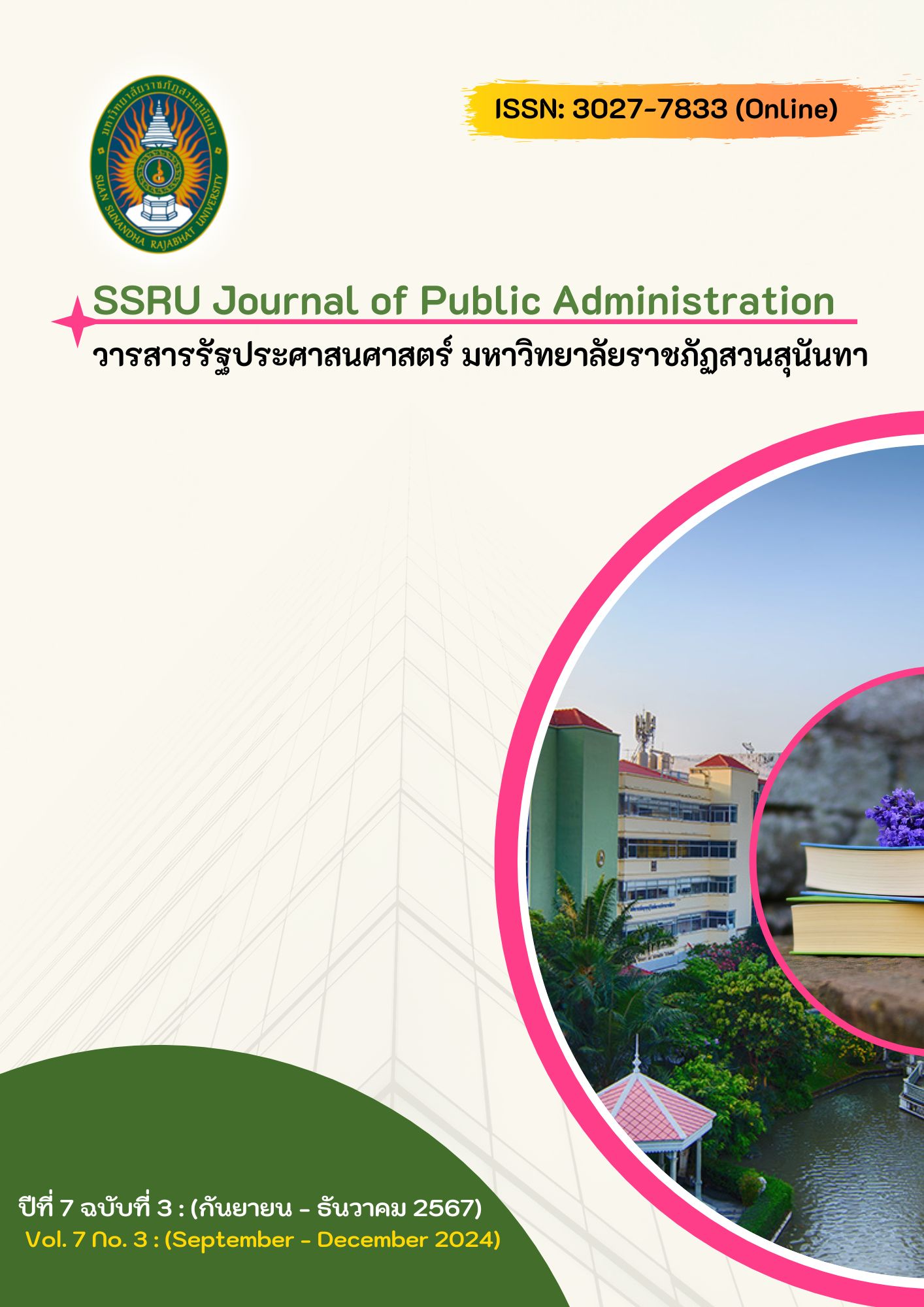Entrepreneurship Course, Absorption Capacity, Personal willing, Affecting the Entrepreneurial Ability of Vocational College Students Yunnan in The People's Republic of China: Moderating the Effects of Social Experiences
Main Article Content
บทคัดย่อ
This paper aims 1) to study the level of satisfaction in marketing mix factors among The research objectives are 1) To study the level of Entrepreneurship Courses, Absorption Capacity, Personal Willingness, and Entrepreneurial ability of Yunnan Vocational College, People's Republic of China 2) To study the level of influence of Entrepreneurship Courses, Absorption Capacity, Personal Willingness that affects Entrepreneurial Ability and 3) To create a causal model of variables that have a causal influence on Entrepreneurship Ability of students of Yunnan Vocational College, People's Republic of China. The sample group is 380 entrepreneurs who were students at the Yunnan Provincial Vocational College. This research uses a combined research method between quantitative research and qualitative research. in quantitative research. The sample group is entrepreneurs who were students at the Yunnan Provincial Vocational College Number of samples: 380. The sample size was determined using a criterion of 20 times the observed variables. A multi-stage random sampling method was used and a questionnaire was used to collect data. Data were analyzed using structural equation modeling. The qualitative research used in-depth interviews. The main group of informants is Entrepreneurial ability of vocational college students Yunnan Number of 20 people.
The research results found that 1) Entrepreneurship Courses, Absorption Capacity, Personal Willingness and Entrepreneurial Ability of Yunnan Vocational College, People's Republic of China at a high level. 2) Entrepreneurship Course, Absorption Capacity, Personal Willingness that affects Entrepreneurial Ability of students of Yunnan Vocational College, People's Republic of China Statistically and 3). Causal models of variables that have a causal influence on Entrepreneurship Ability of Yunnan Vocational College Students, People's Republic of China The researcher developed the name EPAE Model (E- Entrepreneurship Courses, P = Persona willing, A= Absorption Capacity, E= Entrepreneurial Ability)
Article Details

อนุญาตภายใต้เงื่อนไข Creative Commons Attribution-NonCommercial 4.0 International License.
เอกสารอ้างอิง
Bauman, A. & Lucy, C. (2021). Enhancing Entrepreneurial Education: Developing Competencies for Success. The International Journal of Management Education, 19, Article 100293.
Comrey, A. L., & Lee, H. B. (2013). A First Course in Factor Analysis. (2nd Ed.). Psychology Press, Hove.
Craig, C. A., Petrun Sayers, E. L., Gilbertz, S., & Karabas, I. (2022). The development and evaluation of interdisciplinary STEM, sustainability, and management curriculum. The International Journal of Management Education, 20(2). https://doi.org/10.1016/j.ijme.2022.100652
Creswell, J. W. (2003). Research Design: Qualitative, Quantitative, and Mixed Method Approaches. Sage Publications, Thousand Oaks.
Dzhengiz, T., & Niesten, E. (2020). Competences for Environmental Sustainability: A Systematic Review on the Impact of Absorptive Capacity and Capabilities. Journal of Business Ethics, Springer, 162(4), 881-906.
García-Pérez, I., Fernández-Izquierdo, M. Á., & Muñoz-Torres, M. J. (2020). Microfinance Institutions Fostering Sustainable Development by Region. Sustainability, 12(7), 2682.
George, D., & Mallery, P. (2010). SPSS for Windows Step by Step: A Simple Guide and Reference 17.0 Update. (10th Ed.). Pearson, Boston.
Hair, J. F. et al. (2010). Multivariate Data Analysis. (7th ed.). Upper Saddle River, NJ: Pearson Prentice Hall.
Hair Jr., J. F. et al. (1998). Multivariate Data Analysis with Readings. Englewood Cliffs, NJ: Prentice-Hall.
Hulaikah, M. et al. (2020). The Effect of Experiential Learning and Adversity Quotient on Problem Solving Ability. International Journal of Instruction, 13(1), 869-884.
Kline, R. B. (2011). Principles and Practice of Structural Equation Modeling. Guilford Press, New York.
Loo, R., & Thorpe, K. (2000). Confirmatory factor analyses of the full and short versions of the Marlowe–Crowne Social Desirability Scale. The Journal of Social Psychology, 140(5), 628–635.
Mahmood, T., & Mubarik, M. S. (2020). Balancing innovation and exploitation in the fourthindustrial revolution: Role of intellectual capital and technology absorptive capacity. Technological Forecasting and Social Change, 160(1), 120248
Melović, B., Jocović, M., Dabić, M., Vulić, T. B., & Dudic, B. (2020). The impact of digital transformation and digital marketing on the brand promotion, positioning and electronic business in Montenegro. Technology in Society, 63.
https://doi.org/10.1016/j.techsoc.2020.101425
Pishghadam, R., et al. (2023). Students’ willingness to attend EFL classes with respect to teachers’ credibility, stroke, and success: A cross-cultural study of Iranian and Iraqi students’ perceptions. Current Psychology, 42(5), 4065-4079.
Putro, A. K., & Takahashi, Y. (2024). Entrepreneurs' creativity, information technology adoption and continuance intention: Mediation effects of perceived usefulness and ease of use and the moderation effect of entrepreneurial orientation. Heliyon, 10(3), e25479. https://doi.org/10.1016/j.heliyon.2024.e25479
Srimulyani, V. A., Hermanto, Y. B., Rustiyaningsih, S., & Setiyo Waloyo, L. A. (2023). Internal factors of entrepreneurial and business performance of small and medium enterprises (SMEs) in East Java, Indonesia. Heliyon, 9(11), e21637. https://doi.org/10.1016/j.heliyon.2023.e21637
Srimueang, N., & Piatanom, P. (2022). A Comparative of Knowledge Absorption Capacity of School Administrators as Perceived by Teachers in School under the Bangkok Secondary Educational Service Area Office. Journal of Education Studies, 50(2), 1-13.
Weatherton, M., & Schussler, E. E. (2021). Success for All? A Call to Re-examine How Student Success Is Defined in Higher Education. CBE—Life Sciences Education, 20(1), 1-13.
Zadeh, M. R., Hackney, R., & Zeng, J. (2021). Augmenting learning processes of absorptive capacity for innovation: Insights for effective leadership within global pharmaceutical companies. European Management Review, 19(2), 263-284


